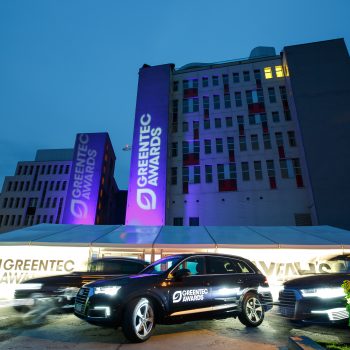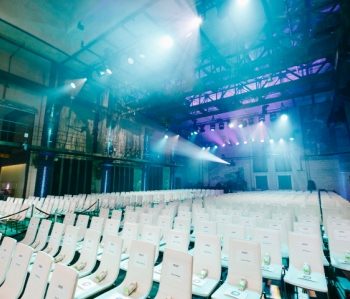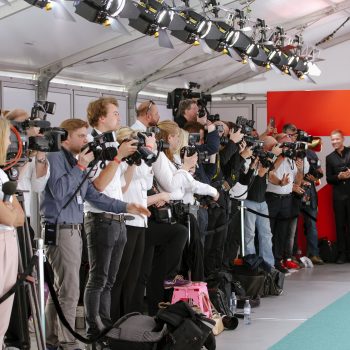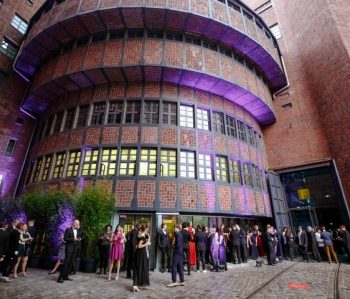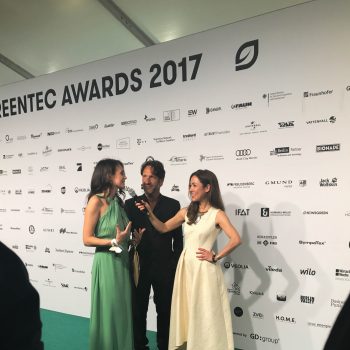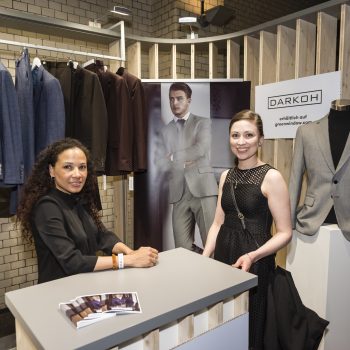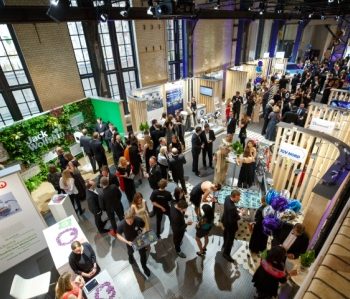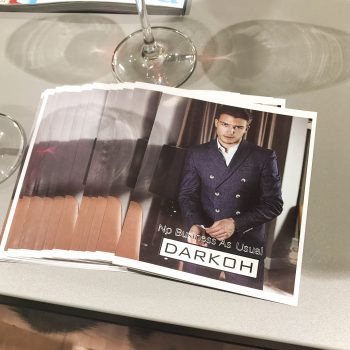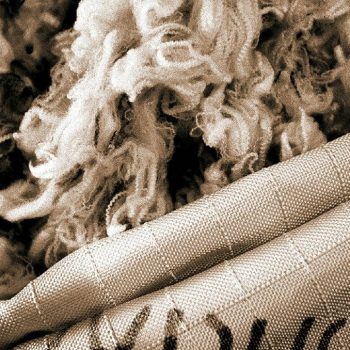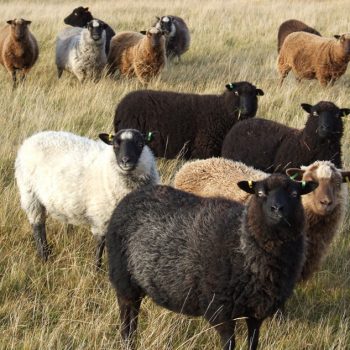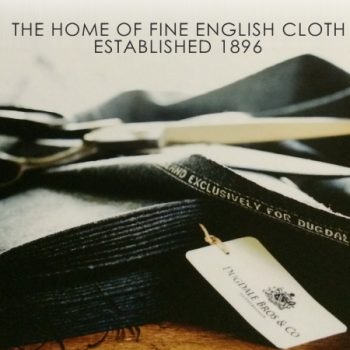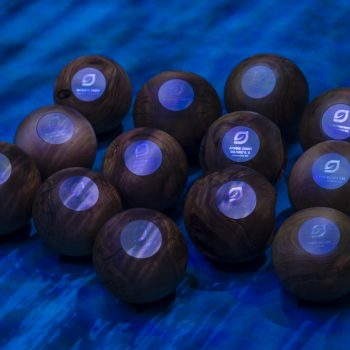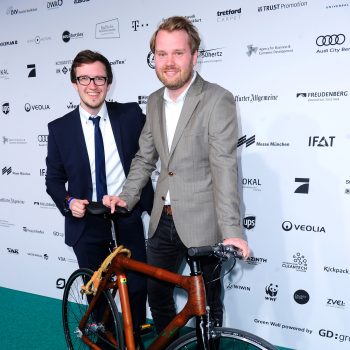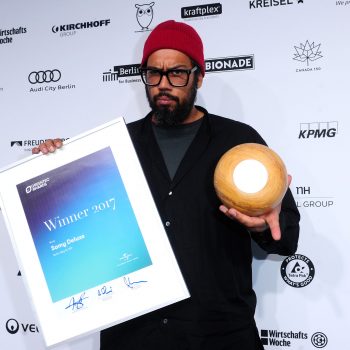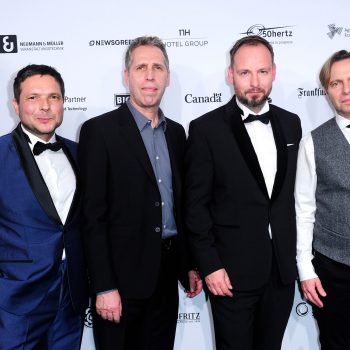How Green Can You Go: DARKOH At The GreenTec Awards
If you haven’t heard about Green Tec Awards by now, then let’s get this out the way first. In 2008, two German engineers came together and thought that inventions and initiatives that support the protection of our resources and environment should be rewarded just like any other award show does with artistic achievements. Every year, companies, organizations, brands and private persons can apply for it with their good deed and are then nominated in 15 different categories such as energy, constructions & living, lifestyle or travel after undergoing a critical analysis by a renowned jury filled with members out of the industry. The highlight of every year is the actual award event where the winner of each category is honored under the spotlight of press, media, and VIPs.
Sounds like an awesome idea? We thought so, too, especially since we’ve collaborated with Greenwindow.com, the online shopping platform associated with GreenTec, which offers eco-friendly and sustainable products for any eco-conscious individual since 2016. So when we were asked by the two founders Marco Voigt and Sven Krueger, if we would like to join forces and collaborate as exhibitors at this year’s GreenTec Award event in Berlin, we did not hesitate.
And it was during our preparation for that day when I started my intense thought process. Of course, we knew about the eco-friendly background of our suits but would the audience accept it? Would we have to use recycled paper for our lookbooks? Could we print our banner on regular foil or was there anything like recyclable plastic? And, could we use our PC to show more styles or explain the online store to booth visitors? Is Toshiba eco-friendly? Maybe MAC is better? Where would sustainability start and eco-friendly end? So we did what we could to comply with what we thought was best, and even provided two of our eco-conscious tuxedos for the two founders to wear during the award ceremony.
It was on the event day, May 12th, 2017, where I learned my biggest lesson about ´going Green´.
The award show took place at E-Werk, an old factory place in the heart of Berlin, and when I arrived every individual was in motion trying to finish the setup in time. I happened to peek into the rehearsals and experienced my first surprise.. a relatively large stage under colorful spotlights, seating arrangements with names marked on chairs and two rehearing show hosts that are well known from TV and media. Nothing felt “green” or “alternative” in a way one might imagine, or at least I did. In my mind, the chairs would have turned into fuel for eco-friendly mobiles afterward or be made out of hemp to go conform with my idea of recyclable sources.
The second lesson, I learned when the first guests arrived and walked the red carpet. Let me correct this – the green carpet, but other than that there was no difference to any high karat award show. More and more well known and renowned prominence from the entertainment world and politics arrived in glamorous gowns and black tie suits walked the step n repeat in bright flashlights and gave interviews to lifestyle reporters. Interesting, I thought, I have to erase the thought of dressing in alternative clothes or Birkenstocks for a Green event; instead, the glamor look was totally fine. But would each of these individuals know, under what conditions their clothes was produced? Was it even a valid question to ask on an evening like this?
So here I was, founder of the fashionable DARKOH, sitting in the exhibition hall next to other exhibitors who in some way distributed eco-friendly products or food or introduced innovative projects to preserve our environment , falling into panic mode. Representing DARKOH in public is usually done by my amazing manager or my PR agent, but I insisted on doing this one myself to get a feel for people who show interest in eco-friendly apparels.
I knew that some would ask about the sustainable aspect of our suits but would it be enough for them to acknowledge my presence? I ran it through several times while the gala was broadcasted on a big screen from the main hall into the exhibitor hall.
‘Our suits are made out of organic fabrics and wool from British mills that only use wool from happy sheep.’ But what are ‘happy sheep? ‘Well, they do not suffer when being shorn and they are held on open fields..so happy sheep herds’. Hmm..Wool? ‘Yes, do you know that wool is one of the most sustainable resources that nature provides? It grows back naturally.’ I could already see the squeeze around the nose and forehead of some critical people. ‘Well, also, all our suits are made within Europe, mainly in Germany, so we do produce under Fair Trade regulations..’ Yes, I thought, this valid argument was much better considering that labor stays within the country and taxes, too. Money is always a convincing argument.
By the time I was done with sorting out my strategy, the first individuals had stopped at the banner, looked up to the selection of suits that was hanging inside the booth, then back to the banner until they smiled at me and asked: So what makes your suits sustainable? That blunt and direct to where it was easy for me to explain a bit more about the production process, the eco-friendly concern, and conscience to know the sources of the products you buy or eat. Many of them expressed the importance of knowing the product sources and if the money supports the right production chain. But the attitude here in Germany differed a bit from the one we were familiar with in the US.
Unlike here in Germany, the sustainable thought among American consumers is less discussed and questioned, which does not mean that it does not exist or is not important. It is very much so. The difference is that it’s just self-declaring that the products they buy are produced under Fairtrade conditions, which is a beautiful thing because it does not push the appearance or the taste of a product to the background. The first aspect of any consumer item should be its use, its fit or taste, and its beauty; the sustainable aspect should be existing, actually mandatory but secondary when picking a product. In conclusion, every product we purchase should preserve our environment period in some way, so we do not have to ask the question, why a product is sustainable; just trust that it is, and now enjoy it. Wouldn’t this be ideal?
When we started DARKOH in the United States, knowing where our fabric comes from and where our suits are produced was as natural as knowing where we get our daily food. The important aspect of sustainability became a topic when we launched our line in Germany, and more and more green brands entered the market using recycled and organic fabrics. In comparison, a suit made out of recycled plastic bottles and offered by the department store Sears was soon taken off the market due lack of sales because the green aspect dominated over the actual function of a suit. And after looking at a few statistics, it made sense. While US citizens are more open to innovative products such as Hybrid and electric cars that protect the environment but struggle with means of recycling waste, Germans are much better in reusing materials that would normally be considered as trash. It explained the questions that were asked that evening and what mattered to German consumers.
Though we do not use hemp or recycled plastic bottles, it shows how eco-friendly a DARKOH suit is and how important it is to put its use first, such as choice of fabric, the colors and the fit. If it also protects the environment – well, hurray, even better. I am convinced that no one or only a handful of guests would have stopped at our booth if we hadn’t put up our stylish banner or jacket on the mannequin that both looked quite appealing. Because think again, who would ask you if your suit is sustainable versus complimenting you on the fit or style ?
How is all this linked to the GreenTec Awards? Well, as my headline already indicated, there are many ways to go green, and this award considers any of these different approaches to keep our environment safe. Projects that were nominated ranged from recovering energy from cruise ship waste, decentralized solar solutions for rural East Africa, to eco – friendly car shuttles, recycled outerwear and bikes made out of bamboos.
But it also acknowledges those who constantly remind us about our social responsibility towards our environment and other people such as hip hop artist Samy Deluxe, who received the award in the category Special Prize Music.
All in all, I learned a lot about sustainability that evening, from exhibitors, consumers, visitors, and from going through a critical thought process about what eco-friendly really means. Being green doesn’t mean becoming vegan or live of recycled good period; it starts with a rethinking process, a critical approach towards your actions, and it continues with buying and living consciously.
Special thanks to the two founder, Marco Voigt, and Sven Krueger, who wore their DARKOH tuxedo during the gala event; and also to the complete GreenTec and Green Window team and their patience.



